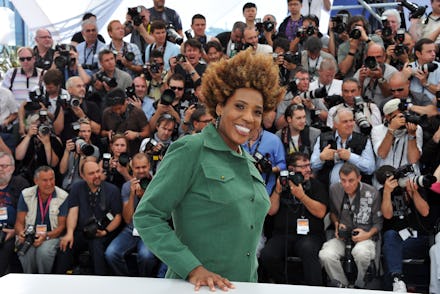Macy Gray talks 'Stripped' and how Beyoncé has helped artists like her take back control

When Macy Gray dropped her breakout single "I Try" in 1999, something about it immediately captivated the world. Maybe it was her sultry rasp, or the song's air of romantic, melancholy lyrics. Either way, the song has become a classic and a staple of Gray's decades-long career — so much so, the Grammy-winning artist knew she had no choice but to include a new version of the track on her upcoming album Stripped 15 years later.
At 48-years-old, Gray feels she's gained a new sort of freedom within the music industry. She's faced the trials of fame and emerged with a clarity. She's overcome substance abuse, addictions, failed press runs when she would fall asleep from partying too hard. Gray even recalls feeling shocked at the sight of her face from repeated drug binges. Now, she's focused on the rewards — her engaged fan base, and features on songs by artists ranging Ariana Grande to Robert Glasper.
At this stage in the game, Gray says she's only inspired to continue making music for one reason: love.
"I'm never in the studio anymore because of pressure — it's because I'm inspired," she said when we connected for a phone interview. "I make music for the love of it."
We discussed Stripped, her upcoming jazz album, set for release Sept. 9 and how Beyoncé's surprise releases have changed the game for artists like her, as well as another studio album she says she's more excited for than anything. "That album is going to have a Macy on it nobody's ever heard before," she said.
The following interview has been edited and condensed for clarity.
Mic: What inspired you to peel back the layers of music production for your upcoming stripped down jazz album at this stage in your career?
Macy Gray: My label approached me wanting to put together this kind of project, they actually pitched it to me a while ago. It's something Chesky Records does a lot of. So I thought about it, and I had to think about it for a while. But I've wanted to put out a jazz album, and I wanted it to be different, so I went through with it when I was ready.
How exactly was your creative process of putting together Stripped different than your other albums?
MG: Well we got together in an old, abandoned church in Brooklyn, instead of the studio. I brought some songs into it that I really wanted to have on it, some of my favorite songs. The label also wanted a couple songs on there. We recorded the entire album in a couple days. It was a lot more relaxed, without all of the extra input.
What songs did the label want on there?
MG: They wanted "Redemption Song," which I really didn't want on there. It's one of my favorite songs.
So why didn't you want it on there?
MG: I just feel like that song is untouchable. Like, anyone who remakes that song isn't doing it justice. There are some songs on there I can do in my sleep, but "Redemption Song" is something that really deserves a lot of respect.
You could say the same thing about "I Try."
MG: You can. That song is in a league of its own. It's a part of the public domain now, like "Happy Birthday." And the label actually told me they wanted "I Try" on the album too, but I knew I didn't have a choice for that one. It made sense. And it sounds good, so I didn't mind that one as much.
Does the final product reflect how you wanted it to sound?
MG: It definitely sounds raw, it definitely sounds real. I've grown up in jazz clubs my whole life, and I've always loved jazz, and it definitely reflects all of that. It's so raw that when I called them up a while later asking about what it sounds like after it was mixed, they told me: "What are you talking about? The album isn't getting mixed." Isn't that crazy? The album wasn't even mixed.
What do you think of the whole surprise release phenomena? Has it had an impact on your music?
MG: Now, there's no structure. There's no real right way of doing things anymore. So I go in the studio or make my music when I feel like it, and I release it when it's ready, because that's what I love to do. The studio is definitely where I belong. Beyoncé and artists like her, completely wiped all that away with their releases.
Instead of releasing a couple of hit albums and disappearing, you've maintained a steady stream of album releases over the course of your career. Do you feel a pressure to remain relevant or reach the same level of success you did in the early 2000s?
Like I said, it's different now. When I was starting to become really well known, there was a process to all of this: your label requests an album, you go make that exact album, you do your marketing, you go on some shit tour. But I'm never in the studio anymore because of pressure. It's because I'm inspired. I make music for the love of it.
Correction: Aug. 19, 2016